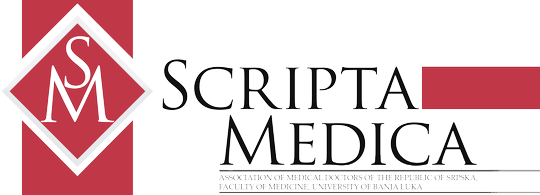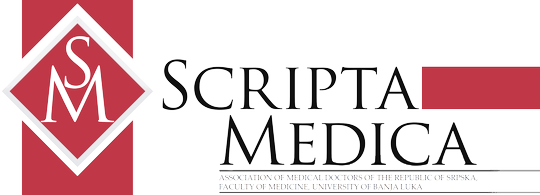RESPONSIBILITIES
- Home
- RESPONSIBILITIES
Authors’ responsibilities
General
Authors warrant that their manuscripts are their original works, that they have not been published before, and are not under consideration for publication elsewhere. Parallel submission of the same paper to another journal constitutes a misconduct and eliminates the manuscript from further consideration. The work that has already been published elsewhere cannot be reprinted in theScripta Medica.
Authors are exclusively responsible for the contents of their submissions. Authors affirm that the article contains no unfounded or unlawful statements and does not violate the rights of third parties.
Authors must make sure that their author team listed in the manuscript includes all and only those authors who have significantly contributed to the submitted manuscript. If persons other than authors were involved in important aspects of the research project and the preparation of the manuscript, their contribution should be acknowledged in a footnote or the Acknowledgments section.
Authors are required to properly cite sources that have significantly influenced their research and their manuscript. Parts of the manuscript, including text, equations, pictures and tables that are taken verbatim from other works must be clearly marked, e.g. by quotation marks accompanied by their location in the original document (page number), or, if more extensive, given in a separate paragraph.
Full references of each quotation (in-text citation) must be listed in the separate section (Literature or References) in a uniform manner, according to the citation style used by the journal. References section should list only quoted/cited, and not all sources used for the preparation of a manuscript.
When authors discover a significant error or inaccuracy in their own published work, it is their obligation to promptly notify the Editor-in-Chief (or publisher) and cooperate with him/her to retract or correct the paper.
By submitting a manuscript the authors agree to abide by the Editorial Policies of Scripta Medica.
Conflict of interest and funding
Authors are responsible for recognising and disclosing financial and other conflicts of interest that might bias their work. They should acknowledge in the manuscript all financial support for the work and other financial or personal connections to the work. It is the responsibility of the authors to specify the title and the code label of the research project within which the work was created, as well as the full title of the funding institution. In case that a submitted manuscript has been presented at a conference and published in the form of abstract only, under the same or similar title, a detailed information about the conference should be provided in the same place.
Ethics and consent
When reporting experiments on human subjects, it should be indicated whether the procedures followed were in accordance with the ethical standards of the responsible committee on human experimentation and with the Helsinki Declaration of 1975, as revised in 1983. Use of patients’ names, initials or hospital numbers, especially in illustrative material is strictly prohibited. Papers including animal experiments or clinical ethics must be accompanied by an approval by the local ethics committee. Date of issue and registration number should be provided.
Identifying information should not be published in written descriptions, photographs and pedigrees, unless the information is essential for scientific purposes and the patient (or parent or guardian) gives written informed consent for publication. Informed consent for this purpose requires that the patient be shown the manuscript to be published.
Editorial responsibilities
The Editor-in-Chief is responsible for deciding which articles submitted to the journal will be published. The decisions are made based exclusively on the manuscript’s merit. They must be free from any racial, gender, sexual, religious, ethnic, or political bias. When making decisions the Editor-in-Chief is also guided by the editorial policy and legal provisions relating to defamation, copyright infringement and plagiarism.
Members of the Editorial Board including the Editor-in-Chief must hold no conflict of interest with regard to the articles they consider for publication. Members who feel they might be perceived as being involved in such a conflict do not participate in the decision process for a particular manuscript.
The information and ideas presented in submitted manuscripts shall be kept confidential. Information and ideas contained in unpublished materials must not be used for personal gain without the written consent of the authors.
Editors and the editorial staff shall take all reasonable measures to ensure that the reviewers remain anonymous during and after the evaluation process in accordance with the type of reviewing in use.
The Editorial Board is obliged to assist reviewers with additional information on the manuscript, including the results of checking manuscript for plagiarism.
Reviewers’ responsibilities
Reviewers are required to provide the qualified and timely assessment of the scholarly merits of the manuscript. The reviewer takes special care of the real contribution and originality of the manuscript. The review must be fully objective. The judgment of the reviewers must be clear and substantiated by arguments.
The reviewers assess manuscript for the compliance with the profile of the journal, the relevance of the investigated topic and applied methods, the scientific relevance of information presented in the manuscript, the presentation style and scholarly apparatus. The review has a standard format. It is submitted through the online journal management system where it is stored permanently.
The reviewer must not be in a conflict of interest with the authors or funders of research. If such a conflict exists, the reviewer is obliged to promptly notify the Editor-in-Chief. The reviewer shall not accept for reviewing papers beyond the field of his/her full competence.
Reviewers should alert the Editor-in-Chief to any well-founded suspicions or the knowledge of possible violations of ethical standards by the authors. Reviewers should recognize relevant published works that have not been considered in the manuscript. They may recommend specific references for citation, but shall not require to cite papers published in Scripta Medica, or their own papers, unless it is justified.
The reviewers are expected to improve the quality of the manuscript through their suggestions. If they recommend correction of the manuscript prior to publication, they are obliged to specify the manner in which this can be achieved.
Any manuscripts received for review must be treated as confidential documents. Reviewers must not use unpublished materials disclosed in submitted manuscripts without the express written consent of the authors.

